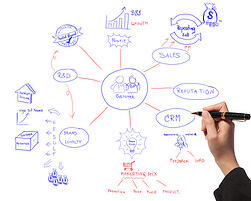
In many ways, CRM, Customer Relationship Management software, is a perfect complement to ERP, or Enterprise Resource Planning software.
They both do different jobs at either end of the business cycle, but for a larger business that wants to look after its customers, as well as control costs, then there are benefits of using CRM and ERP.
For a start-up business, the benefits of using CRM, can be enormous. You need customers to buy the services or products that you are selling, and looking after your customers is a fundamentally basic requirement for any successful business.
This is where CRM comes into its own. One of the major benefits of using CRM, is that it allows you to keep a record of every phone call, meeting or other contact made with your customer.
This is important, not only to refer to in case of a problem, but also so that you can show your customer that their business is important to you. If your customer has raised concerns about a certain stage of your business interaction, one of the benefits of using CRM, is you can immediately pull up the information to ensure that the same problem does not arise again.
You have the ability to link to your customer's website, to keep up to date with the progress of their company. This may allow you to identify other areas where you can do business with your customer.
Timed automated marketing with CRM
Like ERP, CRM can be used across your company, and you can easily integrate emails and phone contacts. A benefit of using CRM is that if one person has made contact with a client or customer, it appears on the CRM system, to those who have the appropriate permission.
This allows you to keep up to date with the latest communications. Bringing all the information together in one place, not only means an improvement in efficiency, but one of the other major benefits of using CRM, is that it can then inform your marketing.
Timed automated systems allow you to control marketing, and generate new leads from existing clients.
Using CRM and ERP to control costs
One of the other benefits of using CRM, is that it will help to reduce costs, and this is where it can tie in with an ERP system. Once your business has grown, success can be just as much due to controlled costs as increased sales, and to achieve both, gives you the best chance of increasing profits. Whereas CRM allows you to document customer interaction and activity, ERP allows you to control your business once you have those regular customers.
An ERP programme allows you to improve your financial reporting. Management information, such as sales statistics or employee costs, together with things like regulatory compliance, can all be brought within the same software, allowing the user to extract information to inform decision making.
Cash flow and liquidity, leading to reduced customer debt, can all be better controlled from an ERP system.
Like CRM, ERP has the advantage that it can make information available across the whole business. As one area impacts on another, the effects can immediately be seen, and any adjustments made.
There is less duplication of tasks across the organisation, and this improves efficiency.
Users report that both systems are extremely good at what they do, but neither as yet, has the ability to be useful across the whole business process.
It may possibly be, that as business software improves, it may be possible to integrate both using online systems. At the present time, it may be worth assessing the benefits of using CRM for your business, and then bring in ERP to fit like a jigsaw, as your business grows in size.



.png?width=120&height=120&name=MicrosoftTeams-image%20(4).png)


